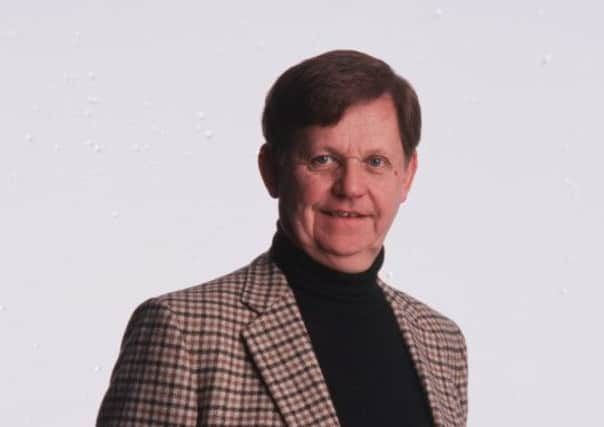Obituary: James Alexander Gordon, reader of the football results on BBC


His pronunciation was impeccable, his delivery careful and modulated and often one could detect a hint of an Edinburgh accent.
James Alexander Gordon – even the name had a ring of authority about it – had one of the most instantly recognisable voices on the radio. For four decades he read the Saturday afternoon football results on Sports Report, first on Grandstand then on BBC Radio 2 and finally on 5 Live. But he also was heard on the BBC World Service, so Gordon had a large audience hanging on every word he uttered.
Advertisement
Hide AdAdvertisement
Hide AdAfter the stirring music (Out of the Blue) the star sports announcers from Des Lynam to Mark Pougatch gave the sporting headlines and handed over to the silken tones of Gordon for the eagerly awaited football results.
Gordon, or “Jag” as he was affectionately known throughout the BBC, assured everyone he was not a supporter of any team but he had a way of adding a certain dramatic effect to the his delivery. “Manchester United,” he would say with an upward slide of the voice before adding: “Five.” Then, as if he was whispering a state secret: “Liverpool, nil.”
A BBC sporting legend has it that Gordon did once announce: “East Fife 4 Forfar 5.” For some reason he always delivered Heart of Midlothian with a theatrical flourish and much enjoyed rolling the letter R when he announced the result for Airdrieonians.
Gordon was brought up by adoptive parents who owned a pub in Edinburgh. At six months old he contracted polio and he spent many years undergoing treatment in hospital. He learnt to pronounce many words from RAF officers who were recuperating in the same hospital after the Second World War. Gordon was an avid listener of the wireless and gained an instinctive love of words and language. He was not able to play sport and learned to walk with raised-sole footwear.
He studied music – both the piano and clarinet – and his first job was as a pianist on cruise liners. He was first heard on the BBC in 1972 as a news and continuity announcer after an executive heard him speaking informally. His gentle, reassuring Scottish accent proved ideal for radio and Gordon was immediately engaged.
He was on duty one Saturday afternoon and had read the 4 o’clock news when a producer asked him to “nip across to the sports room and read the classifieds, old chap”. On hearing Gordon’s first broadcast, his father, back in Edinburgh, cried: “The wee bugger’s finally done it.” Thus started one of the finest traditions of UK sports broadcasting. Jag became the sound of teatime on Saturdays.
Gordon said he wasn’t nervous that afternoon but recalled: “I trained as a musician and I think music had a lot to do with the way I read them. I thought it would be nice to make it a little different, with a bit of excitement.”
Gordon was a much loved figure in the BBC – the Corporation allowed him to stay on after retirement age as he had become such an institution. Once when he had a coughing fit on air Broadcasting House was inundated with cough sweets from listeners.
Advertisement
Hide AdAdvertisement
Hide AdHis smart appearance and painstaking enunciation of names became a byword for the BBC. Occasionally, however, a result raised the Gordon voice more than just a touch. He was doing a midweek shift when Inverness knocked Celtic out of the cup. “How marvellous,” Gordon commented, “that Scottish football can still produce results like that.”
Gordon’s legion of followers included comedian Eric Morecambe, on whose early career radio show Gordon had been an announcer. Morecambe, a devoted football fan himself, often used to mimic Gordon’s delivery of the results.
At the start of his career, Gordon often had to think while on the microphone. Most matches were on a Saturday afternoon and if the tele-printer malfunctioned, things could get challenging in the studio. Gordon remained unflappable throughout. He always said he wanted to “die with the microphone in my hand” but he was diagnosed with throat cancer and left the BBC last year. His successor was the former Radio 4 newsreader Charlotte Green, who said that replacing Gordon was a “huge honour”.
With his cheerful smile and ebullient personality, Gordon was a consummate professional and a much loved broadcaster. “If the home team won,” he once admitted, “I was happy for them and I reflected that in my voice. If the away team lost I was sad for them.”
Gordon was married to Julia and she and their son survive him.